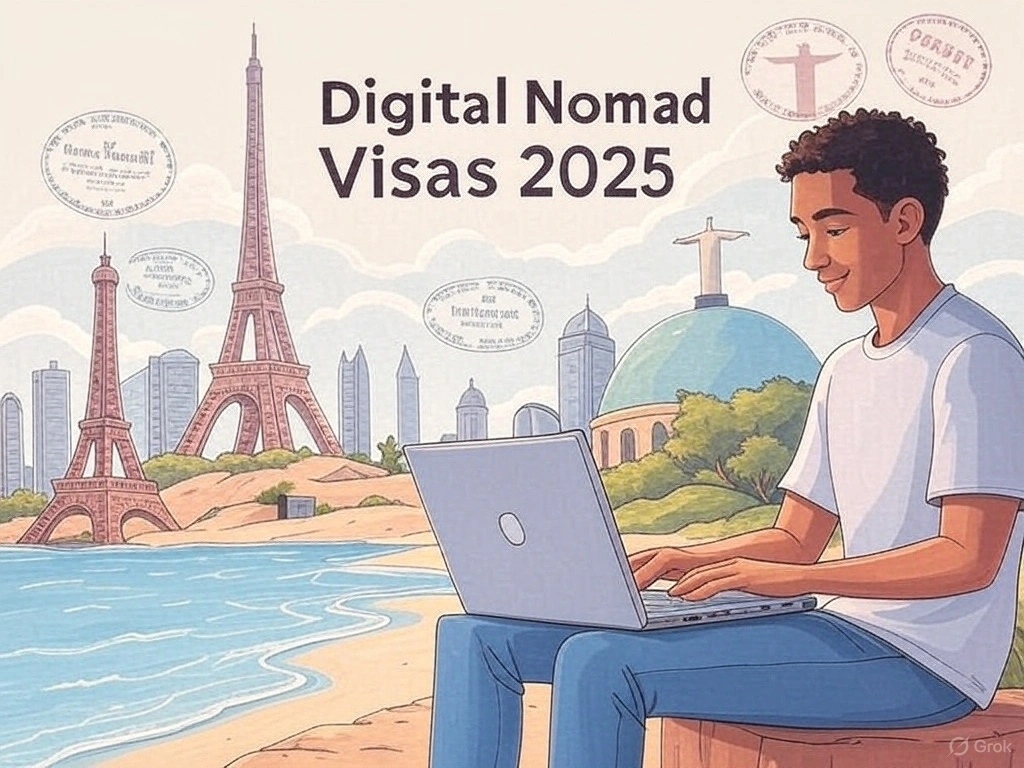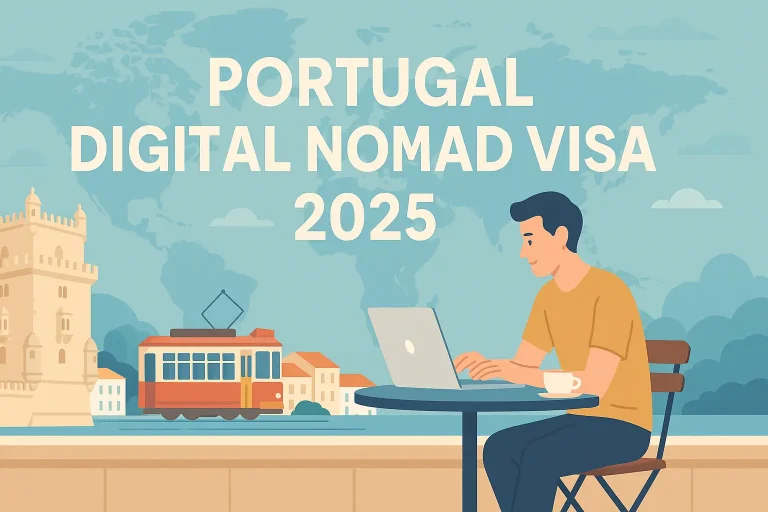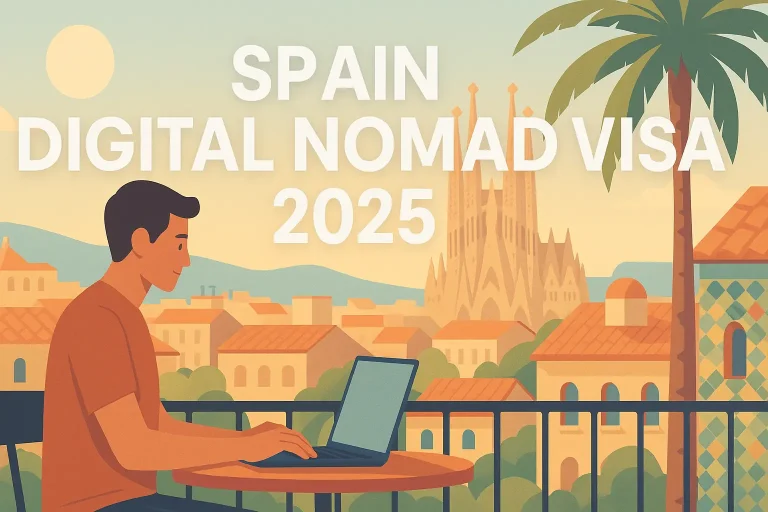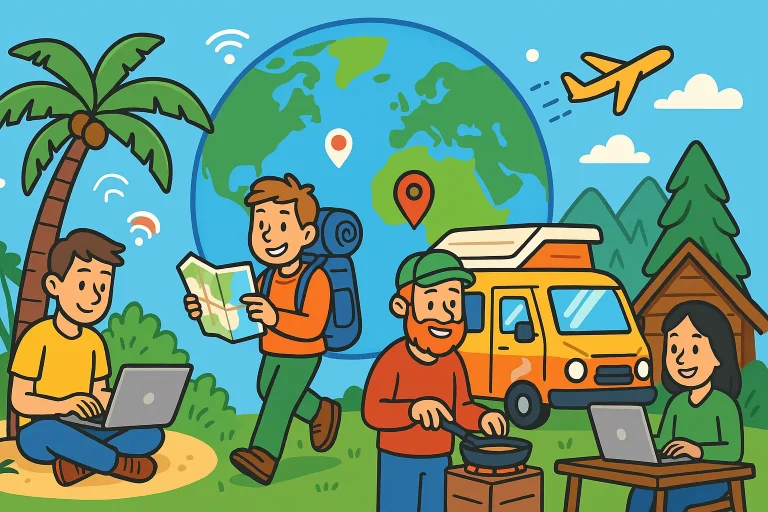Digital Nomad Visas in 2025: The Ultimate Country-by-Country Guide
Discover the top digital nomad visas in 2025 that let you work legally while living in paradise.

In 2025, working from anywhere isn’t just a dream, it’s a lifestyle supported by law.
More than ever, countries across the globe are competing to attract remote workers through tailored digital nomad visas. Whether you’re freelancing from a beach in Bali, consulting from a co-working space in Lisbon, or coding from a mountaintop café in Georgia, there’s likely a visa built for you.
But here’s the catch: the rules, costs, and benefits vary wildly from one country to the next. Some offer fast-track applications and tax breaks, while others require proof of hefty income or savings. That’s where this guide comes in.
We’ve created a comprehensive, up-to-date resource for digital nomads in 2025, listing the key requirements, costs, durations, and application methods for each country offering a remote worker visa. Whether you’re planning a long-term move or just browsing options, this is your one-stop roadmap to working legally abroad.
Ready to find your next digital home? Let’s dive in.
Digital Nomad Visa Summary Table (2025)
| Country | Visa Name | Min Income (USD/month) | Duration | Application Type | Full Guide Link |
| Portugal | D8 Digital Nomad Visa | $3,700 | 1 year → 2-year res. | Online / Consulate | Read more |
| Spain | Digital Nomad Visa | $2,950 | 1–3 years | Online / Consulate | Read more |
| Croatia | Digital Nomad Residence Permit | $3,100 | Up to 1 year | Online / In-Country | Read more |
| Thailand | Destination Thailand Visa | $15,000 (savings) | 180 days → 5 yrs | Online / Consulate | Read more |
| Indonesia | Remote Worker Visa (E33G) | $5,000 | 1 year (renewable) | Online | Read more |
| Malaysia | DE Rantau Nomad Pass | $2,000–$5,000 (monthly) | 3–12 months | Online | |
| Mexico | Temporary Resident Visa | $2,595 | 1–4 years | In-person (consulate) | Read more |
| Colombia | Digital Nomad Visa | $995 | Up to 2 years | Online | Read more |
| Costa Rica | Digital Nomad Visa | $3,000 (solo) | 1–2 years | Online / In-person | |
| Georgia | Remotely from Georgia | $2,000 or $24K savings | Up to 1 year | Online | |
| Mauritius | Premium Visa | $1,500 | 1 year (renewable) | Online | |
| UAE (Dubai) | Virtual Working Program | $3,500 | 1 year | Online |
🇵🇹 Portugal – D8 Digital Nomad Visa
Portugal continues to top the list for digital nomads in 2025, and for good reason. With its sunny coastlines, affordable living, and reliable internet, it’s an ideal remote-work haven. The D8 Digital Nomad Visa is Portugal’s answer to the global shift toward location-independent lifestyles.
Quick Facts
- Visa Name: D8 Digital Nomad Visa (Remote Worker Visa)
- Minimum Monthly Income: €3,480 (approx. USD 3,700)
- Savings Requirement: €10,440 in bank balance
- Duration: 1-year visa, renewable as a 2-year residence permit
- Application Type: Online or via Portuguese consulates
Eligibility Requirements
To qualify, you must:
- Be a non-EU citizen working remotely (employee, freelancer, or business owner)
- Show proof of sufficient income and bank savings
- Provide a remote work contract or business ownership documents
- Have a lease or accommodation booking in Portugal
- Possess valid travel insurance or Portuguese private health insurance
Why Choose Portugal?
- Visa-holders can bring dependents
- Pathway to permanent residency and citizenship
- Access to Portugal’s public healthcare and NHR (non-habitual resident) tax scheme
- Vibrant expat hubs in Lisbon, Porto, and Madeira
🔗 Read our full guide on Portugal’s Digital Nomad Visa
🇪🇸 Spain – Digital Nomad Visa
Spain officially entered the digital nomad space with its long-awaited visa law, and it’s already a top pick for remote workers in 2025. From Barcelona’s tech scene to the sun-soaked streets of Seville, Spain offers incredible lifestyle perks alongside a relatively straightforward application process.
Quick Facts
- Visa Name: Digital Nomad Visa (under the Startup Act)
- Minimum Monthly Income: €2,763 (approx. USD 2,950)
- Duration: 1-year visa, extendable to 3 years (renewable up to 5)
- Application Type: Through Spanish consulates or in-country immigration offices
Eligibility Requirements
To apply, you must:
- Work remotely for a company outside Spain or freelance with international clients
- Have at least 3 years of relevant professional experience or a university degree
- Show proof of income, accommodation, and health insurance
- Pass a clean criminal record check (last 5 years)
Why Choose Spain?
- Remote workers benefit from reduced tax rates under the “Beckham Law”
- Family members can join under the same visa type
- Ideal for EU/Schengen travel lovers
- Excellent healthcare system and fast-growing co-working culture
🇭🇷 Croatia – Digital Nomad Residence Permit
Croatia made headlines in 2021 by being one of the first EU countries to launch a digital nomad visa, and the momentum hasn’t slowed. With its mix of medieval towns, Adriatic coastlines, and budget-friendly living, Croatia remains a 2025 favorite among remote workers.
Quick Facts
- Visa Name: Digital Nomad Residence Permit
- Minimum Monthly Income: €2,870 (approx. USD 3,100)
- Duration: Up to 1 year (non-renewable; reapply after 6-month gap)
- Application Type: Online or in-person at Croatian police stations
Eligibility Requirements
To qualify, applicants must:
- Work remotely for a non-Croatian company or be self-employed abroad
- Provide proof of income via bank statements or employment contracts
- Secure Croatian accommodation and valid travel insurance
- Show a clean criminal background and passport validity of 12+ months
Why Choose Croatia?
- No income tax on foreign-earned income for digital nomads
- Rich culture, UNESCO heritage cities, and excellent seasonal weather
- Strong Wi-Fi infrastructure and rising nomad communities in Split and Zagreb
- Flexible entry and visa extension policies compared to stricter EU nations
🇹🇭 Thailand – Destination Thailand Visa (DTV)
Thailand’s new Destination Thailand Visa (DTV), launched in 2024, is designed to attract remote workers, freelancers, and long-term travelers. With its vibrant culture, affordability, and tropical charm, Thailand remains a magnet for digital nomads in 2025.
Quick Facts
- Visa Name: Destination Thailand Visa (DTV)
- Minimum Requirement: THB 500,000 in savings (approx. USD 15,000)
- Duration: Valid for 5 years with 180-day stays per entry (can extend once)
- Application Type: Online or at a Thai consulate (must apply from outside Thailand)
Eligibility Requirements
Applicants must:
- Be at least 20 years old
- Have a remote job or freelance career with clients outside Thailand
- Provide proof of financial stability and valid health insurance
- Hold a passport valid for at least 6 months
Why Choose Thailand?
- Access to digital nomad hotspots like Chiang Mai, Bangkok, and Phuket
- Affordable living, vibrant street food scene, and strong travel infrastructure
- Visa offers long-term stay flexibility without the need for continuous renewals
- Popular for solo nomads, creators, and startup founders
🇮🇩 Indonesia (Bali) – Remote Worker Visa (E33G)
Indonesia, and especially Bali, continues to rank as a global hotspot for digital nomads. In 2024, the government launched the E33G Remote Worker Visa, offering a more structured and legal pathway for remote professionals to stay long-term in paradise.
Quick Facts
- Visa Name: Remote Worker Visa (E33G)
- Minimum Monthly Income: USD 5,000
- Duration: 1-year stay permit (KITAS), renewable
- Application Type: Online via Indonesia’s immigration portal
Eligibility Requirements
To qualify, you must:
- Be at least 18 years old
- Be employed by a non-Indonesian company or work as a self-employed remote professional with international clients
- Provide proof of income through bank statements or payslips
- Hold a valid passport, flight itinerary, and international health insurance
Why Choose Indonesia?
- Bali offers co-working hotspots like Canggu and Ubud with thriving nomad scenes
- Low cost of living with luxurious accommodation options
- Rich cultural experiences and natural beauty
- Indonesia plans to exempt foreign-earned income from local tax if not remitted, a huge perk for remote workers
🇲🇾 Malaysia – DE Rantau Nomad Pass
Malaysia’s DE Rantau Nomad Pass offers a flexible and affordable visa option for digital professionals looking to base themselves in Southeast Asia. With top-notch infrastructure, modern cities, and incredible food, Malaysia is gaining serious attention from nomads in 2025.
Quick Facts
- Visa Name: DE Rantau Nomad Pass
- Minimum Annual Income:
- USD 24,000 for IT/tech freelancers
- USD 60,000 for non-tech applicants
- USD 24,000 for IT/tech freelancers
- Duration: 3 to 12 months, renewable for another 12 months
- Application Type: Online via DE Rantau platform
Eligibility Requirements
To be eligible, you must:
- Be at least 18 years old
- Work remotely as a freelancer, independent contractor, or remote employee for a non-Malaysian company
- Provide proof of income, active contracts or employment letters
- Hold valid health insurance and passport
Why Choose Malaysia?
- Hub cities like Kuala Lumpur and Penang offer excellent coworking scenes
- Lower cost of living than many neighboring countries
- Reliable transportation, multilingual locals, and diverse culture
- Strategic location for traveling across Southeast Asia
🇲🇽 Mexico – Temporary Resident Visa
Mexico remains a top pick for digital nomads in 2025, thanks to its flexible visa options, vibrant culture, and strong expat communities. While not marketed specifically as a digital nomad visa, the Temporary Resident Visa works perfectly for remote workers seeking a longer stay.
Quick Facts
- Visa Name: Temporary Resident Visa
- Minimum Monthly Income: USD 2,595 (or savings of $43,000 over the past 12 months)
- Duration: 1 year, renewable up to 4 years
- Application Type: In-person at a Mexican consulate abroad
Eligibility Requirements
You’ll need to:
- Prove steady income or sufficient savings
- Provide a valid passport and passport-size photos
- Show a letter from an employer or proof of freelance/independent income
- Complete an in-person interview and provide biometric data
Why Choose Mexico?
- No official digital nomad category = flexible rules for remote work
- Major cities like Mexico City, Oaxaca, and Playa del Carmen are digital nomad hotspots
- Excellent food, culture, and affordability
- Easy visa extensions and welcoming communities
🇨🇴 Colombia – Digital Nomad Visa (Visa V Nómadas Digitales)
Colombia’s Digital Nomad Visa offers a modern, streamlined option for remote workers. Whether you’re soaking up Medellín’s year-round spring weather or tapping into Bogotá’s tech ecosystem, Colombia is a rising remote work destination in 2025.
Quick Facts
- Visa Name: Visa V Nómadas Digitales
- Minimum Monthly Income: USD 995
- Duration: Up to 2 years
- Application Type: Online via the Ministry of Foreign Affairs
Eligibility Requirements
To apply, you’ll need:
- A remote job or self-employment with foreign clients
- A valid passport with at least 6 months of validity
- Proof of income and international health insurance
- A letter from your employer or a motivational letter for entrepreneurs
Why Choose Colombia?
- One of the lowest income thresholds for digital nomads
- Medellín is a top-ranked nomad city for its cost of living and quality of life
- Warm culture, vibrant food scene, and strong Wi-Fi in urban areas
- Tax exemptions apply if you stay under 183 days
🇨🇷 Costa Rica – Digital Nomad Visa
Costa Rica’s Digital Nomad Visa makes it easier than ever to work from paradise. With its eco-conscious culture, stable government, and beautiful landscapes, it’s a dream destination for nature-loving nomads in 2025.
Quick Facts
- Visa Name: Digital Nomad Visa
- Minimum Monthly Income: USD 3,000 (individual), USD 4,000 (with dependents)
- Duration: 1 year, renewable for 1 more year
- Application Type: Online or in-person at Immigration
Eligibility Requirements
Applicants must:
- Show bank statements proving the income threshold
- Hold valid health insurance and a clean criminal record
- Provide proof of accommodation and a return ticket
- Submit an application through Costa Rica’s “Trámite Ya” platform
Why Choose Costa Rica?
- No local income tax for remote workers
- Eco-friendly lifestyle, surfing, hiking, and wildlife-rich national parks
- Established expat and nomad communities in San José and Tamarindo
- Easy process for bringing dependents
🇬🇪 Georgia – Remotely from Georgia
Georgia’s innovative Remotely from Georgia program offers visa-free digital nomad entry for many passport holders, and it’s still one of the easiest and cheapest options in 2025.
Quick Facts
- Visa Name: Remotely from Georgia Program
- Minimum Monthly Income: USD 2,000 or savings of $24,000
- Duration: Up to 1 year
- Application Type: Online
Eligibility Requirements
You must:
- Be from one of the 95 approved countries
- Show income or savings proof
- Have valid travel/health insurance
- Work for a foreign company or as a freelancer with international clients
Why Choose Georgia?
- Visa-free access for many nationalities
- Low cost of living and fast internet
- Tbilisi is a growing nomad and startup hub
- No local tax liability if you don’t register a local business
🇲🇺 Mauritius – Premium Visa
Mauritius combines tropical island living with remote work stability. Its Premium Visa allows digital nomads to stay for up to a year while enjoying tax benefits and modern infrastructure.
Quick Facts
- Visa Name: Premium Visa
- Minimum Monthly Income: USD 1,500 (plus USD 500 per dependent)
- Duration: 1 year (renewable)
- Application Type: Online
Eligibility Requirements
Applicants must:
- Prove financial stability and long-stay accommodation
- Hold valid health and travel insurance
- Be employed remotely or own a business serving clients outside Mauritius
Why Choose Mauritius?
- Zero tax on foreign income if not remitted locally
- White sand beaches and high-end living standards
- Strong healthcare and digital infrastructure
- Quiet, safe, and family-friendly
🇦🇪 United Arab Emirates (Dubai) – Virtual Working Program
The UAE’s Virtual Working Program, centered in Dubai, offers a sleek, business-friendly option for remote professionals. It’s one of the few digital nomad visas designed for high-income earners and entrepreneurs in 2025.
Quick Facts
- Visa Name: Virtual Working Program
- Minimum Monthly Income: USD 3,500
- Duration: 1 year
- Application Type: Online
Eligibility Requirements
To qualify, applicants must:
- Be employed by a foreign company or own a business for at least a year
- Have a passport valid for 6+ months
- Show proof of income and UAE-compatible health insurance
Why Choose the UAE?
- Access to Dubai’s luxury lifestyle and world-class infrastructure
- Open bank accounts, rent apartments, and enroll kids in school
- No income tax
- Great base for travel across Europe, Asia, and Africa
Ready to Choose Your Digital Home?
In 2025, digital nomads have more freedom than ever, but that freedom comes with paperwork. With over a dozen countries offering tailored remote work visas, the world is truly your office.
Whether you’re chasing island vibes in Mauritius or settling into Europe’s historic charm, the key is to find a visa that matches your lifestyle and income. Bookmark this guide, explore the detailed country pages, and start planning your next big move.
Visa requirements are subject to change. This guide is based on information from official immigration portals as of April 2025. Always verify with the country’s embassy or government website before applying.






